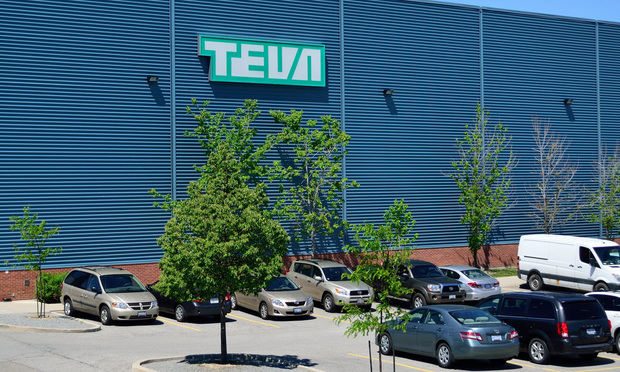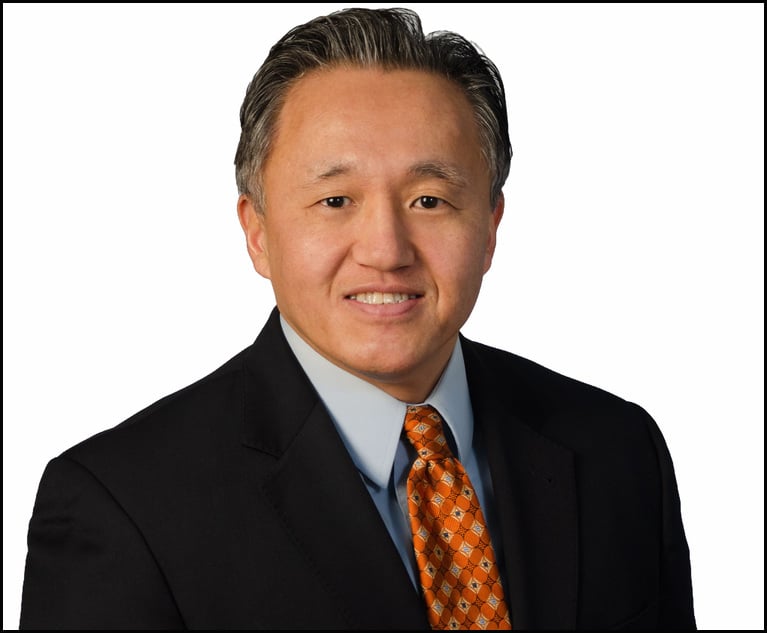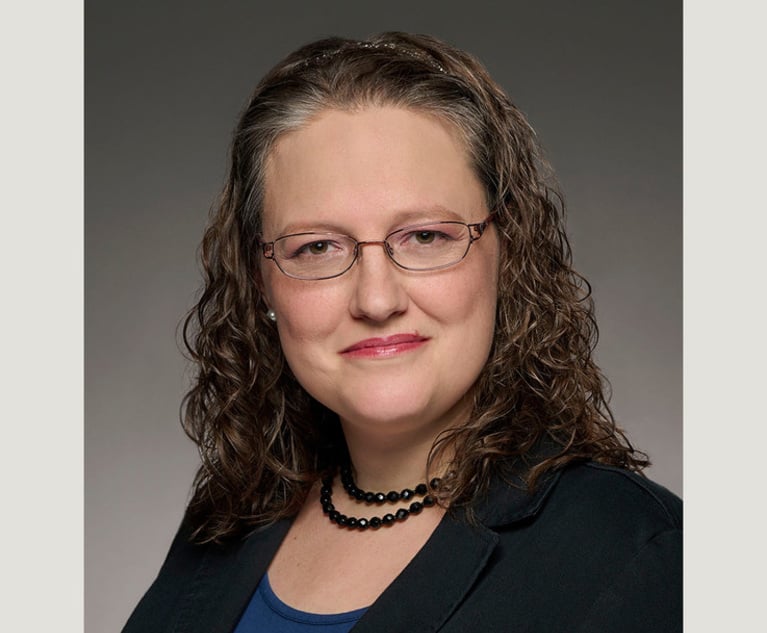GlaxoSmithKline Seeks to Reinstate $235M Infringement Verdict Against Teva Over Hypertension Drug
GlaxoSmithKline is appealing a Delaware federal district judge's ruling that wiped out a $235 million verdict against Teva Pharmaceuticals for allegedly infringing a patent for the hypertension drug Coreg.
May 15, 2018 at 03:25 PM
3 minute read
 Photo Credit: Raysonho/Open Grid Scheduler/Grid Engine via Wikimedia Commons
Photo Credit: Raysonho/Open Grid Scheduler/Grid Engine via Wikimedia Commons GlaxoSmithKline is appealing a Delaware federal district judge's ruling that wiped out a $235 million verdict against Teva Pharmaceuticals for allegedly infringing a patent for the hypertension drug Coreg.
GSK's Fish & Richardson attorneys on Monday filed a notice of appeal to the U.S. Court of Appeals for the Federal Circuit seeking to overturn U.S. District Chief Judge Leonard P. Stark of the District of Delaware's final judgment last month that Teva's ”skinny label” for a generic version of Coreg did not induce infringement of GSK's patent.
A Wilmington jury originally found in favor of GSK last summer and awarded the Philadelphia-based drugmaker $234.1 million for lost profits and another $1.4 million in royalties after a six-day trial in June. But Stark reversed the verdict in a post-trial opinion, ruling that the evidence in the case did not support a finding of induced infringement against Teva.
The notice of appeal was signed by Douglas E. McCann, a principal in Fish's Delaware office. Representatives from GSK and Teva did not return calls Tuesday seeking comment on the case.
GSK, however, has said there was “ample” evidence that Teva had improperly marketed its generic as a substitute for Coreg. The company argued in post-trial briefing, that Teva's label for the beta-blocker carvedilol had encouraged patients and doctors to use its product to treat congestive heart failure, or CHF, even though it had a specific “carve out” that excluded the chronic disease.
Teva, whose U.S. operations are based in North Wales, Pennsylvania, has argued that a host of other factors had led doctors to prescribe its generic for uses other than the narrow indication listed on its label. In court documents, Teva said physicians had been influenced by industry publications, research studies and even GSK's own marketing—and not Teva's skinny label alone.
In March, Stark sided with GSK on the issue of inducement, though he did not disturb the jury's decision to uphold the validity of GSK's patent.
“The court's determination, however, is that—given the dearth of evidence that doctors read and understand and are affected by labels, and given the vast amount of evidence that doctors' decisions to prescribe carvedilol during the relevant periods were influenced by multiple non-Teva factors—such an inference was an unreasonable one for the jury to have drawn,” he wrote in a 26-page opinion.
Final judgment in the case was entered April 25.
According to court filings, Teva is reserving its affirmative defenses in the case, while GSK plans to argue for enhanced damages, should the Federal Circuit reinstate the verdict.
Attorneys for both sides were not immediately available to comment.
GSK was represented by W. Chad Shear, Martina Tyreus Hufnal, Craig Countryman, Douglas E. McCann, Elizabeth M. Flanagan, Jeremy D. Anderson, Michael A. Amon, Robert M. Yeh and William R. Woodford of Fish & Richardson. Limin Zheng, formerly of Fish, was also listed as an attorney who represented GSK. Fish lawyers came from the firm's Southern California, Delaware and Twin Cities offices.
Teva was represented by Christopher T. Holding, Daryl L. Wiesen, Alexandra Lu, Andrew E. Riley, Corrine L. Lusic, Ira J. Levy, J. Anthony Downs and Jennifer L. Ford of Goodwin Procter.
The case is captioned GlaxoSmithKline v. Teva Pharmaceuticals USA.
This content has been archived. It is available through our partners, LexisNexis® and Bloomberg Law.
To view this content, please continue to their sites.
Not a Lexis Subscriber?
Subscribe Now
Not a Bloomberg Law Subscriber?
Subscribe Now
NOT FOR REPRINT
© 2025 ALM Global, LLC, All Rights Reserved. Request academic re-use from www.copyright.com. All other uses, submit a request to [email protected]. For more information visit Asset & Logo Licensing.
You Might Like
View All
3rd Circ Orders SEC to Explain ‘How and When the Federal Securities Laws Apply to Digital Assets’
5 minute read
Womble Bond Dickinson's Wilmington Office Sees New Leadership as Merger Is Completed
4 minute read

Trending Stories
- 1'A Death Sentence for TikTok'?: Litigators and Experts Weigh Impact of Potential Ban on Creators and Data Privacy
- 2Bribery Case Against Former Lt. Gov. Brian Benjamin Is Dropped
- 3‘Extremely Disturbing’: AI Firms Face Class Action by ‘Taskers’ Exposed to Traumatic Content
- 4State Appeals Court Revives BraunHagey Lawsuit Alleging $4.2M Unlawful Wire to China
- 5Invoking Trump, AG Bonta Reminds Lawyers of Duties to Noncitizens in Plea Dealing
Who Got The Work
J. Brugh Lower of Gibbons has entered an appearance for industrial equipment supplier Devco Corporation in a pending trademark infringement lawsuit. The suit, accusing the defendant of selling knock-off Graco products, was filed Dec. 18 in New Jersey District Court by Rivkin Radler on behalf of Graco Inc. and Graco Minnesota. The case, assigned to U.S. District Judge Zahid N. Quraishi, is 3:24-cv-11294, Graco Inc. et al v. Devco Corporation.
Who Got The Work
Rebecca Maller-Stein and Kent A. Yalowitz of Arnold & Porter Kaye Scholer have entered their appearances for Hanaco Venture Capital and its executives, Lior Prosor and David Frankel, in a pending securities lawsuit. The action, filed on Dec. 24 in New York Southern District Court by Zell, Aron & Co. on behalf of Goldeneye Advisors, accuses the defendants of negligently and fraudulently managing the plaintiff's $1 million investment. The case, assigned to U.S. District Judge Vernon S. Broderick, is 1:24-cv-09918, Goldeneye Advisors, LLC v. Hanaco Venture Capital, Ltd. et al.
Who Got The Work
Attorneys from A&O Shearman has stepped in as defense counsel for Toronto-Dominion Bank and other defendants in a pending securities class action. The suit, filed Dec. 11 in New York Southern District Court by Bleichmar Fonti & Auld, accuses the defendants of concealing the bank's 'pervasive' deficiencies in regards to its compliance with the Bank Secrecy Act and the quality of its anti-money laundering controls. The case, assigned to U.S. District Judge Arun Subramanian, is 1:24-cv-09445, Gonzalez v. The Toronto-Dominion Bank et al.
Who Got The Work
Crown Castle International, a Pennsylvania company providing shared communications infrastructure, has turned to Luke D. Wolf of Gordon Rees Scully Mansukhani to fend off a pending breach-of-contract lawsuit. The court action, filed Nov. 25 in Michigan Eastern District Court by Hooper Hathaway PC on behalf of The Town Residences LLC, accuses Crown Castle of failing to transfer approximately $30,000 in utility payments from T-Mobile in breach of a roof-top lease and assignment agreement. The case, assigned to U.S. District Judge Susan K. Declercq, is 2:24-cv-13131, The Town Residences LLC v. T-Mobile US, Inc. et al.
Who Got The Work
Wilfred P. Coronato and Daniel M. Schwartz of McCarter & English have stepped in as defense counsel to Electrolux Home Products Inc. in a pending product liability lawsuit. The court action, filed Nov. 26 in New York Eastern District Court by Poulos Lopiccolo PC and Nagel Rice LLP on behalf of David Stern, alleges that the defendant's refrigerators’ drawers and shelving repeatedly break and fall apart within months after purchase. The case, assigned to U.S. District Judge Joan M. Azrack, is 2:24-cv-08204, Stern v. Electrolux Home Products, Inc.
Featured Firms
Law Offices of Gary Martin Hays & Associates, P.C.
(470) 294-1674
Law Offices of Mark E. Salomone
(857) 444-6468
Smith & Hassler
(713) 739-1250






